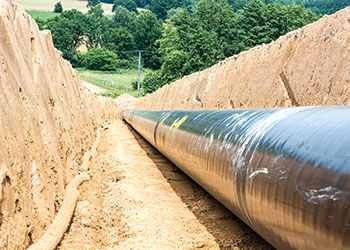
 Ihring ... audit findings can enhance quality and safety management
Ihring ... audit findings can enhance quality and safety management
It is recommended that pipeline health checks be performed annually as well as any time there are major changes to pipeline operations, or the leak detection system itself, or when there has been a large turnover in employees, Maximilian Ihring, Global Pipeline and Leak Detection Manager, KROHNE, tells OGN
It is more important than ever to ensure that the pipeline leak detection system of operators is working properly.
Leaks can be disastrous for pipeline operators, who are entrusted with getting potentially hazardous product from one point to another.
As safety regulations tighten for all pipeline operators around the world, how is that impacting the Middle East and Africa?
Leak detection systems often perform well when installed, but over time numerous factors can cause them to deteriorate.
Investigations have shown that the main causes of serious consequences from leak events were related to insufficient maintenance and insight into the leak detection system.
So, how can you know whether your pipeline network is sufficiently monitored in all operating conditions and if all parts of the system are functioning properly? Are you meeting all the legal requirements and industry standards?
A complete audit of the pipeline leak detection system can help to ensure that all of these questions are answered positively.
Being able to prevent everything from small leaks to catastrophic events allows pipeline operators to avoid polluting the environment, paying big fines, losing money in lost product, and tarnishing their brand.
With more than 35 years of international experience in the field of pipeline leak detection, Krohne has developed a vendor-agnostic programme that supports pipeline operators to ensure that leak detection is managed and improved continuously throughout the lifetime of the pipeline.
Krohne’s PipePatrol Health Check is an audit performed by leak detection specialists who have been involved in more than 400 pipeline projects. The service is a relatively inexpensive investment that requires no effort by the pipeline operator and can yield valuable insight.
A complete and confidential audit covers the following areas:
 |
Leak detection systems can deteriorate over time |
• Fundamentals: Review installed leak detection methods’ key performance indicators (KPIs) against the operator’s desired performance, industry best practices, and best available technology (recommend how to achieve desired KPIs). And determine if company/pipeline controller personnel are ready to operate the system and react appropriately in case of a leak or emergency.
• Compliance: Ensure the operator’s computational pipeline monitoring methods and procedures are in line with the API RP 1130 leak detection programme and evaluate the leak detection programme using the API RP 1175 gap analysis tool.
• Physical state: Review the current health and operational status of the leak detection system in place, including hardware, software, and cybersecurity elements, to answer questions such as: Is there newer hardware that can perform better? Have there been operational changes that impact software? Are there any newer security requirements that need to be addressed?
• Complete an uptime analysis for the past year and understand how much time was the system fully functional, degraded, or non-functional.
• Performance: Test system performance through a simulation or an actual fluid withdrawal to determine sensitivity, accuracy, and reliability. This answers questions, such as: What size leak will trigger an alarm? How closely can a leak be pinpointed?.
Other insight provided by the audit can aid in the development of a strategy for dealing with nuisance alarms, which can overwhelm operators.
Pipeline operators can select a comprehensive audit or start with a subset of tests to ensure that the most pressing issues are addressed, and then later extend the programme to full coverage as part of a long-term test strategy for continuous improvement.
Krohne recommends that the PipePatrol Health Check be performed annually as well as any time there are major changes to pipeline operations, or the leak detection system itself, or when there has been a large turnover in employees.
The audit findings can be used to enhance quality and safety management or to support the needs of regulators or other third-party interests.
* The Krohne Group is a global manufacturer and provider of process instrumentation, measurement solutions and services across key industries including as oil and gas, water and waste water management, metal and mining, power and chemical plants.








































































